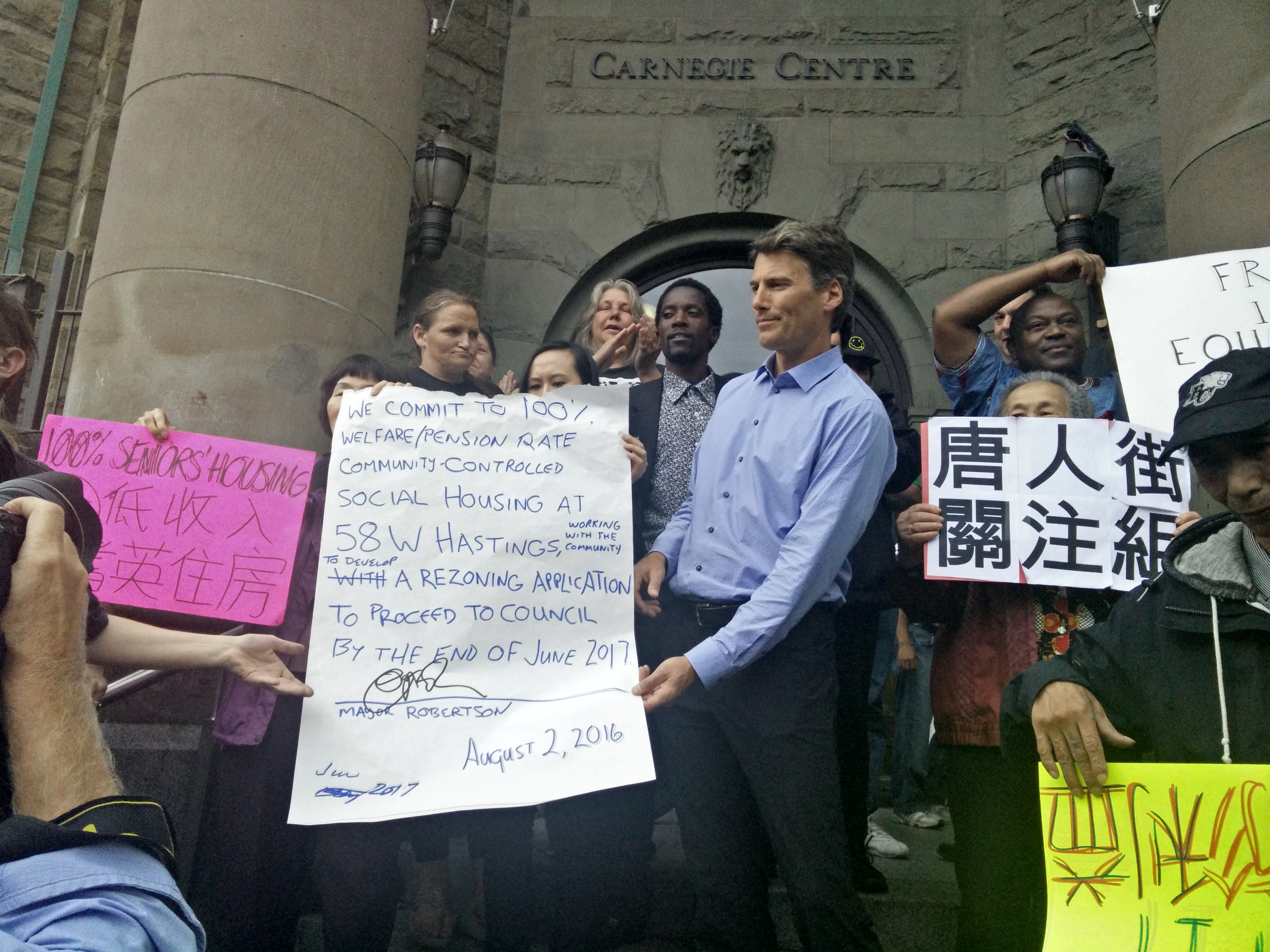Vancouver Mayor Gregor Robertson says the empty lot at 58 West Hastings will be developed for welfare- and pension-rate housing—just not yet. It could take “several years” for 300 new social housing units to replace the colourful tent city that’s sprung up on the Downtown Eastside lot.
While the mayor pledged to rezone the site by next June to allow for the new construction, he said progress hinges on commitments from the provincial and federal governments. “So it’s not a short-term solution,” he said on Tuesday, standing on the steps of the Carnegie Community Centre.
“It’s going to take several years to get this place rezoned and ultimately built,” the mayor conceded.
Nonetheless Robertson promised to expedite the rezoning process after meeting for an hour with Downtown Eastside community members, city planners, and Councillor Andrea Reimer.
He added that the city would put pressure on the provincial government to ensure that new units built on the site are affordable at shelter and welfare rates.
“Right now it’s the middle of summer and our shelters are full, which is unbelievable,” Robertson said. “We’re seeing homeless camps.
“That means there has to be some action. We need to have more support from the B.C. government—and I’ve talked to [housing] Minister Coleman about this. I think they recognize there’s a crunch right now—not only in Vancouver, but Victoria, Abbotsford, Maple Ridge. And we want the federal government at the table too.”
While bureaucracy turns, the tents stay
The empty lot at 58 West Hastings is one of seven sites the two-year-old Vancouver Affordable Housing Agency identified last June as being suitable for affordable housing, among 23 that the city first offered in February. The agency is also sitting on $62 million earmarked to fund development housing through 2018, with a goal of creating as many as 2,500 new affordable units by 2021.
That means it could be years before the roughly more than 100 men and women living under fabric shelter at 58 West Hastings are able to move on to homes built of bricks and mortar.
Robertson expressed concern about the campers’ health and safety in the interim. “Tent camps are never safe over the long-term,” he said. “We’re working now on a daily basis with the camp to make sure that conditions are safe, and that people can access housing from that site.”
Meanwhile the tent city’s organizers say they’re not going anywhere, so long as the issues that brought them together—slumlords, lack of shelter space or affordable housing, the dilapidated state of ‘single-room occupancy’ hotels—remain unresolved.
“We’re here to show that many, many people in the Downtown Eastside are homeless,” said Laura Shaver, president of the Vancouver Area Network of Drug Users and one of the first to pitch a tent on the site on July 9. “Look at how fast this pumped up, and you still see how many people are sleeping in the street? It’s insane.”
“We don’t want single-room occupancies,” she said. “A lot of people living in those are fighting with bugs, the rats—not having hot water, not having working toilets. We have a better toilet [at the tent city] than in some of the buildings.”
Another camper who’s “not going anywhere” is Samona Marsh. “We’re so tired of living in places like that SRO, where we had more bugs in there than there is out here. We want our own kitchen. We want our own bathroom.”
At the tent city, Marsh said, residents are working hard to follow safety and fire codes as well as they can, keeping tents three feet apart, not burning candles, and keeping garbage to a minimum. “As long as we have the fire chief happy, then we’re good,” she said.
Super InTent City folds up
While the Vancouver campers are digging in for the long haul, about 100 people who have been pitching their tents outside the provincial courthouse in Victoria for nine months are beginning to move into more permanent shelter in a building purchased by the province and run by Vancouver’s Portland Hotel Society.
Chrissy Brett, a tent city solidarity supporter and volunteer who began living at the site up to six days a week last December, said campers began signing residential contracts with the province on Monday and have started to move out.
“People are ready, they’re moving over to the new facility,” Brett said by phone from the Victoria campsite on Wednesday. “There was 15 yesterday, a few preparing today. The plan is 10 people a day, it’s their estimate and goal.”
“There are a number of people that have been missed on the list who will have to wait until Monday,” she added—the day a court-imposed deadline requires all the campers to fold their tents.
Brett said that while communication has been “dismal” between the Victoria tent city residents and government officials, she’s been amazed at how many social housing units were opened up, and the positive relationship that began to build between the campers and police.
“Everything happened like it promised,” she said. “We’ll have to see where we go. There’s still homeless people in Victoria.” And Vancouver.
(Provincial Housing Minister Rich Coleman did not return calls by press deadline.)
Funders for The Tyee’s Housing Fix project in 2016/17 are Vancity Credit Union and Catherine Donnelly Foundation, in collaboration with Columbia Institute. Funders of special solutions reporting projects neither influence nor endorse the particular content of our reporting. Megaphone readers separately supported this particular series on homelessness solutions through a spring 2016 crowdfunding drive.
Other publications wishing to publish this article or other Housing Fix articles, please contact solutions editor Chris Wood. ![]()
Read more: BC Politics, Housing, Municipal Politics
















Tyee Commenting Guidelines
Comments that violate guidelines risk being deleted, and violations may result in a temporary or permanent user ban. Maintain the spirit of good conversation to stay in the discussion.
*Please note The Tyee is not a forum for spreading misinformation about COVID-19, denying its existence or minimizing its risk to public health.
Do:
Do not: